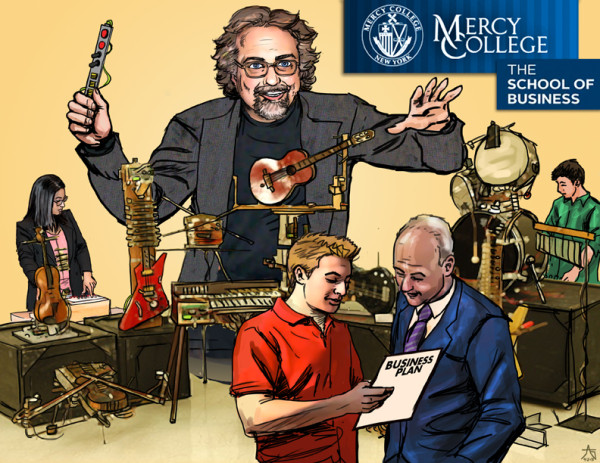
“What”™s the business model?” Curt Abel, an associate professor and director of social entrepreneurship at the Mercy College School of Business, poses the question before an audience on the Dobbs Ferry campus.
He steps around tables displaying bizarrely wired and mechanically operated musical instruments ”“ violins, guitars, keyboards ”“ hooked up to levers, laptops and homemade-looking control panels of keys and dials. Drums on the outer rim of the eclectic instrumental layout wear what look like EKG electrode patches on their skins. It all appears to be the inventive fantasy of an electrical engineer with an irrepressible musical streak or of a musician who enjoys fooling with electronics in the key of Rube Goldberg.
“How do you make money on this?”
Take another look at that electrified array of strangely customized instruments and interfaces. If you have a ready answer to Abel”™s question, he and his next-door neighbor and business partner in Mamaroneck, Kurt Coble, might want to hear it.
Guided by Abel, 15 business students in Mercy”™s social entrepreneurship institute and new Enactus program have been asking and trying out answers to those questions this school year. With another professor”™s help, they”™ve written a mission statement for the inventor”™s business. They”™ve helped assemble the instruments in a workshop at Mercy”™s Yorktown Heights campus. They”™ve helped haul and set up the instruments at an inaugural test market venue.
The college last fall became a member university of Enactus, a global nonprofit that fosters partnerships of students and business and academic experts to develop and implement business enterprise projects in needy communities worldwide. With its focus on money-making community projects, Enactus well complements the “learn by doing” method that drives business education at Mercy since Ed Weis, a former managing director at Merrill Lynch, arrived last year as dean of the business school.
Enactus is “about for-profit but also about doing good, and doing it in an entrepreneurial fashion,” Abel tells his Mercy audience.
Abel and his students think these instruments could do some social good if marketed as a form of therapy ”“ recreational, musical ”“ for disabled persons and geriatrics with physical or mental limitations. Then again, all kids could have fun playing them, Abel says. Finding the target market is still a work in progress.
The work of invention is that of Kurt Coble, a violinist trained at the Eastman School of Music in Rochester. The business for which Mercy”™s Enactus students have also launched a website, Studio 7 Robotics Music Co., was founded by him.
He prefers to stick to musical robotic invention and leave the business modeling and strategizing to his marketing-savvy neighbor and the business school kids at Mercy. “You can”™t do both,” he tells us at Studio 7”™s public debut on campus.
A native of rural northwest Pennsylvania, Coble has made a living as a freelance musician in New York City. “My night gig,” as he calls it, is as solo violinist in the “Phantom of the Opera” orchestra on Broadway. Phantom has been his steady gig for 20 years ”“ his pit debut was with a tour show in Portland, Oregon ”“ and he sounds a bit weary of it.
“I play sappy music every night,” he says. After that cloying sweetness, the computer-aided discordance he demonstrated for his Mercy audience on a gleaming violin whose strings were overlaid with metal levers like clunky orthodontic braces is refreshingly musical to his well-trained ears. His Phantom-acclimated audience though, offered no applause.
Coble says he started his robotic inventions “as a macabre joke.” As a professional musician on Broadway, he is ever threatened by the prospect of losing his job to synthesizers and electronic music that don”™t come with the human baggage, the quirks and foibles of flesh-and-blood musicians.
“I wanted to see if I could make a robotic violin,””™ he tells his audience. “It started out as kind of a sick joke in my basement.”
The technology and “this desire to push the envelope of western music” led Coble and Richard Ryniker, a retired IBM programmer, to develop the P.A.M. Band ”“ Partially Artificial Musicians, that is.
The inventors have described the wired-up instruments as a collection of “musical robotic kinetic sculptures.”
Using motion and optical sensors, Coble has developed instruments whose most beneficial use and target market could be with the physically and mentally disabled. Coble says he is working on voice-activated music. He wants too to look at neurological connections and the possibility of thought-activated music, “the ultimate wireless connection.”
Four years ago, Abel joined his inventive neighbor and beer-drinking companion as managing partner in the startup robotics business. “I”™m a marketer,” he tells us. He teamed with Coble after working about a year as vice president of product strategic alliances at MasterCard Worldwide in Purchase. Before that he had been a marketing director at United Retail Inc. and at American Express.
At Mercy College, the professor”™s venture with his next-door neighbor was opportune for the new learn-by-doing business program on campus.
“Enactus was looking for a project,” says Andrew Vatier, an 18-year-old freshman from Queens and president of Enactus at Mercy. The students took on a consulting role with Studio 7 Robotics Music Co.
“We”™re the business brains behind it,” says Vatier, whose notable poise as a public speaker in a black business suit might be traced to his Kids ”™N Comedy training as a stand-up performer in New York City clubs. “We want to find out what”™s this best for and who”™s going to benefit most from this technology.”
Abel says the business likely will be set up as a B corp or benefit corporation in New York, one of several states that allow the creation of private corporations that make a profit from operations that also must benefit society and the environment.
The Mercy team and Studio 7 have their first test market with mentally disabled adults at a SPARC Inc. (Special Program and Resource Connection) venue in Elmsford. The SPARC Music Lovers, whose players are in their late 20s to mid-30s, recently began jamming on the robotic instruments at their Wednesday night sessions.
“It”™s a very entertaining thing and a fun thing,” says Randy Stuart, the group”™s instructor.
Vatier and Abel have met with officials at Richmond Community Services in Yonkers about adding the recreational therapy as a service for the organization”™s developmentally disabled clients and residents. Richmond will write a grant proposal to fund the program.
Students are learning the limitations and ultimate responsibility of their role as consultants, Abel says. “It”™s his business. What does he want?” That”™s the question they must keep in mind.
The inventive musician is relieved and grateful to have the youthful help and advice on the business side.
“This is such a great thing for me,” says Coble. “The kids are so great.”



















